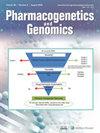Celecoxib pathways: pharmacokinetics and pharmacodynamics.
Abstract
The selective COX-2 inhibitor, celecoxib, shows a complex but important pharmacogenomics profile. The use of this highly effective anti-inflammatory and antitumor drug is limited by concerns about its potential for increased cardiovascular risk. Although the mechanism of action of celecoxib is well studied and many large clinical trials have examined its efficacy, we still lack a complete understanding of the sources of variability in the occurrence of adverse effects as well as the differential risk profile for all drugs in the NSAID class. Preliminary work showed that genetic factors influence response to celecoxib and may be useful in selecting individuals at risk for adverse events. However, the existing pharmacogenetic studies of celecoxib toxicity are still exploratory, with limited sample size and limited number of events. NSAIDs are widely used, and the lower gastrointestinal toxicity of the coxibs represents an important potential advantage over nonselective NSAIDs, as long as we can identify those at an increased risk for cardiovascular toxicity. Larger outcome trials and comprehensive analysis of both pharmacokinetic and pharmacodynamic candidate genes are needed to identify genetic markers to predict variations in response and celecoxib-induced adverse events.





